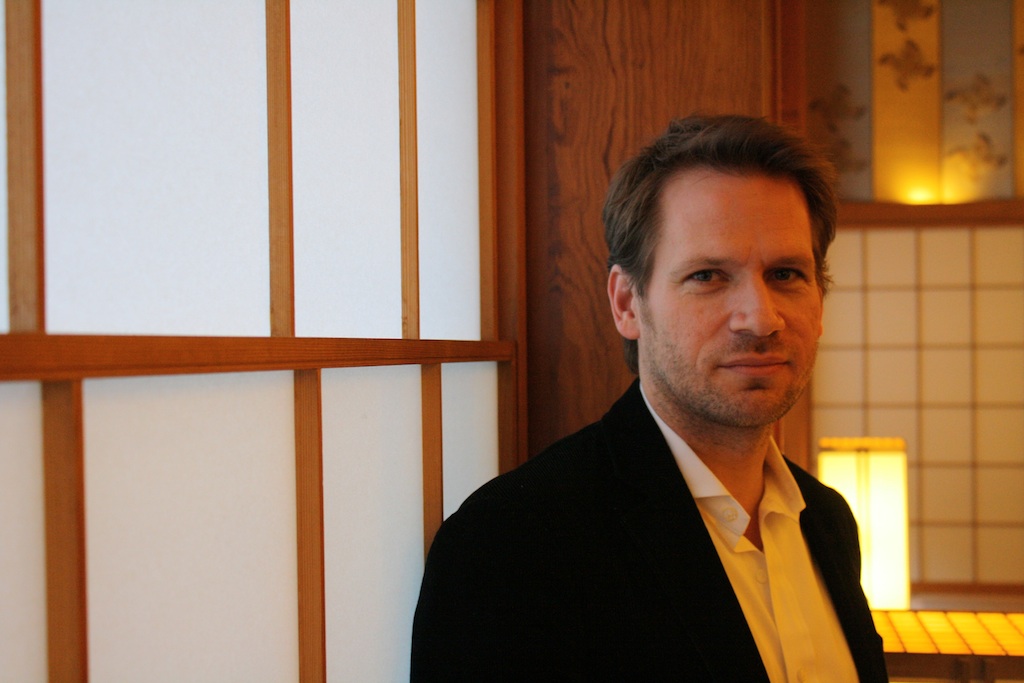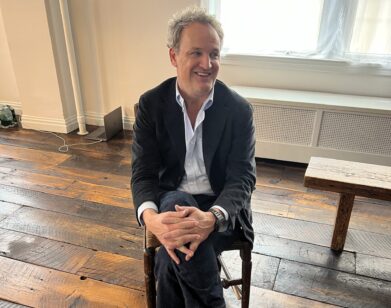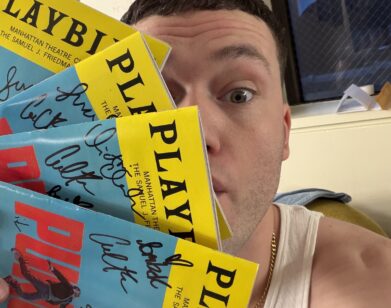John Freeman’s Personal Library

ABOVE: JOHN FREEMAN. PHOTO COURTESY OF DEBORAH TREISMAN.
Sitting on a couch in his spacious and well-lit Chelsea apartment, John Freeman is framed by a massive wall of books. How to Read a Novelist, Freeman’s second book, is a collection of his interviews over the years with some of the leading lights of this library. Names like Toni Morrison, NgÅ©gÄ© wa Thiong’o, and John Updike fill the pages. It’s a departure from his first work, The Tyranny of Email—a look at the history of epistolary and electronic correspondence—but it covers territory perhaps more familiar to Freeman, the former editor of literary magazine Granta and longtime freelance critic and interviewer.
How to Read a Novelist opens with an essay called “U and Me,” about Freeman injecting himself into an interview with Updike, mentioning that he had recently been divorced. He disappears for the rest of the book, serving as a camera through which the reader can come to—in some ways—know the authors contained within. We say down with Freeman to discuss John Updike, Freeman’s bookshelf brain, and the perfect novel.
MICHAEL HAFFORD: Did you have an idea when you were interviewing Updike of, “Oh my God, this just went totally off the rails?”
JOHN FREEMAN: [laughs] I had gotten up at 5 a.m. to go to divorce court and I had driven to this museum. I had interviewed Updike twice before, so I wasn’t nervous. I was actually looking forward to it. Divorce was the last thing from my mind but once the interview started—here we were looking at paintings he had written about in his book [Still Looking: Essays on American Art], and he was talking about it in real time, and he was so genial and good at it that it made it seem like having the best museum guide ever. What happened was the photographer didn’t show up and I was tired, so my appearance gave away the lie of what I had just experienced. I was tired, unshaven, blue jeans, you know, whatever. I don’t know if I put this in there, but I had sold all these Updike first editions to partially buy my engagement ring and then just before that interview I started buying them back.
HAFFORD: The same ones or different copies of the first edition?
FREEMAN: Sometimes the same ones, which is a really low experience as a book collector. It’s like going back to buy the drugs from your dealer. [laughs] I started with poetry because I was broke and it was easy to carry around and I was reading a lot at the time. The book that I had brought for him to sign was the book he wrote the year he got divorced—this book of poems called Tossing and Turning. I was like, “Oh god, he probably thinks I’m a fucking psycho.” And he did. [laughs]
HAFFORD: You’re nicely framed by that giant bookcase. I heard that Richard Howard has reams of storage units that are just filled to the brims with books. I’ve never seen them, of course, but his office is full of them.
FREEMAN: It sounds like he lives in a book-lined, fairly small Greenwich Village apartment, which, considering how many books he’s translated alone, must be kind of hell. I always feel like a bookcase is like my brain manifest, because the books I’ve read—when I can’t see them… The next book I’m writing is about poetry, and I had to pack up part of my poetry, so when I can’t see them, I feel like I’m losing a part of my brain. That’s probably a problem as well. I have to learn how to use my brain rather than see it.
HAFFORD: When you talk about the architecture of a book, are you talking about plot structures?
FREEMAN: I’m talking about plot structures, but I’m also talking about the implied philosophical questions of certain points of view and powers that are allowed to bear on the direction of a novel. Like, talking in class [at Columbia] the other day: can you write a novel while being equivocal about whether God exists? I don’t know that you can. If you have characters in action, you have to have some belief, as in: life is just chance and chaos or character is fate and your character is made up and predetermined or your character is determined by decisions and behaviors. Or that we’re all fallen creatures and we seek redemption and the only redemption that we can get is from God, which is what happens in A Tale of Two Cities. I don’t feel that those questions are thought about anymore, and I feel that that’s to the detriment of the novel. When I was interviewing A.S. Byatt and she was about to go around talking about Phillip Roth’s then-current novel, The Dying Animal, which is a David Kepesh where this guy falls in love with a Cuban woman and they have porno sex and he gets caught up in something and maybe gets in trouble. Byatt had a really interesting read of the book, which is that Roth—who is an atheist, a stone-cold atheist—was writing about what happens when love dies and you don’t believe in God. You’re just left with a body. In the middle of the interview, which I couldn’t quote because it ran in a Scottish newspaper originally, she said, “You just wind up with the cunt.” She went on to talk about how Roth’s later books—especially from Sabbath’s Theater onward—are investigations of the limits of our possession by our own flesh. You see this in the later books—it becomes more about the dying of the flesh. A Dying Animal and Everyman, which was originally called A Medical History because it’s so much about what breaks down. I think what gives Roth’s books their power—aside from their language and the intensity of his intelligence—is that even though he doesn’t believe in God—I don’t either, I’m not doing this as a polemic Christian—he knows he has to answer those questions in his books. Which is: if there is no afterlife, if all we have is our lifetime, what does it mean? What are the things that matter? I think the best novelists always have those really big questions in mind.
HAFFORD: You talk about Phillip Roth’s The Ghost Writer as a “perfect novel.” Is that the only perfect novel, or are there others?
FREEMAN: No, no. When I say perfect, I mean, one of the things that Updike did really well, he had a list of sort of Hippocratic Oath rules for reviewers. And one of the tenets was, “Always judge a book by what it’s trying to be, not what you want it to be.” The Ghost Writer is flawless in achieving what it sets out to do. You can read it in a single setting. It’s got this rivet-less narration where you don’t feel it being created. The language, also, there’s not a single misstep anywhere, even in the sense that interesting things can happen with interesting missteps. I think Gilead by Marylinne Robinson is a really, practically perfect novel. Walker Percy’s The Moviegoer. It’s not just those kind of elegant, slightly refracted narrations where it’s told from memory. I think Junot Diaz’s The Brief Wondrous Life of Oscar Wao is perfect, as is Love in the Time of Cholera [by Gabriel García Márquez] as is—to some degree—The Tin Drum [by Günter Grass]. I think it’s about this mixture of achievement of what it’s meant to do and coherence. Where you feel like everything matters in the book. It’s like that moment of when you’re listening to music and even when it’s got several melodies or a complicated beat, it’s also in perfect harmony. I’m probably going way out of my league here but even with dissonant music, if you can push through the pain into some deep neural harmony of: “This is what life is!” Harmony of meaning and the sound of language is where the perfection occurs. A lot of novels wax in and out of that thing. Doing the work, moving the story along, you feel the intensity wane and you have a time to doze. The ones where you’re glued to it the whole time because it’s that intense—those are the masterpieces.
HOW TO READ A NOVELIST IS OUT TODAY, OCTOBER 8. JOHN FREEMAN IS IN CONVERSATION WITH BRITISH JOURNALIST AND NON-FICTION WRITER GEOFF DYER TOMORROW, OCTOBER 9, AT POWERHOUSE BOOKS IN DUMBO.






